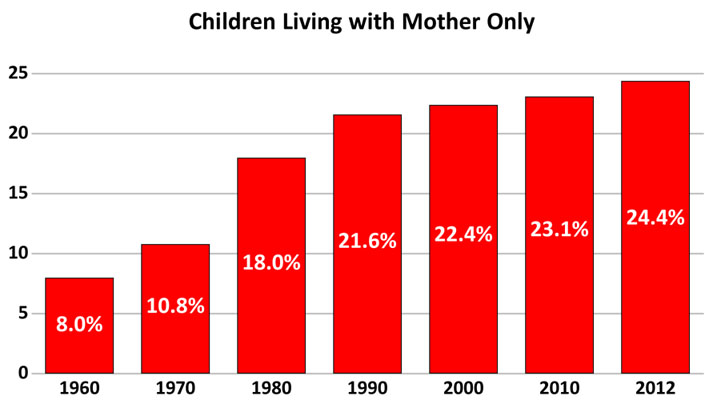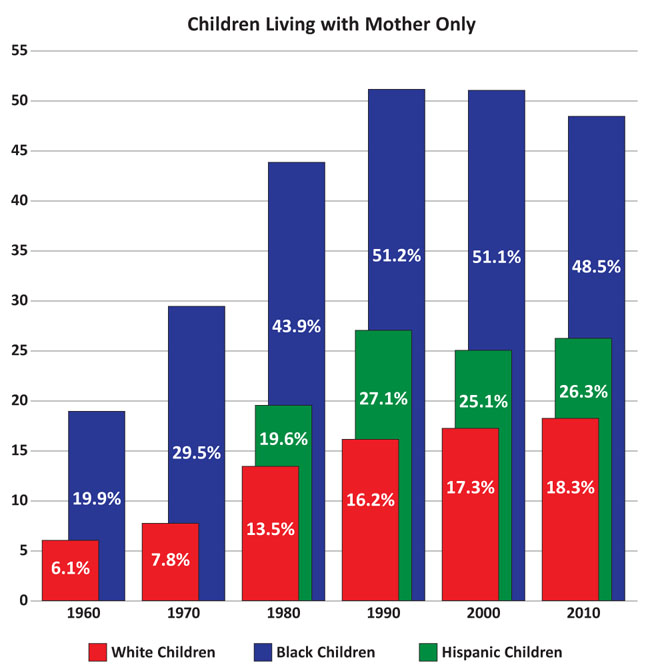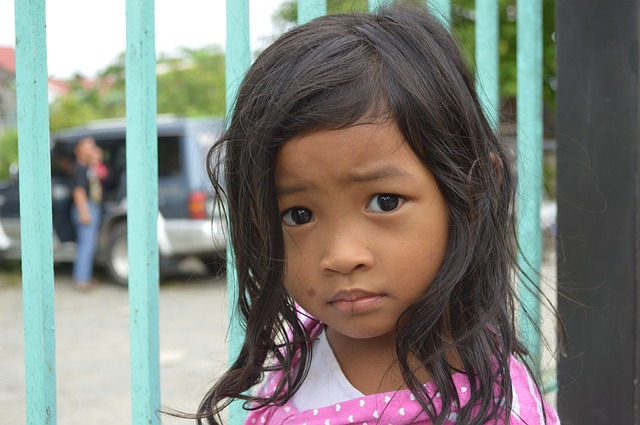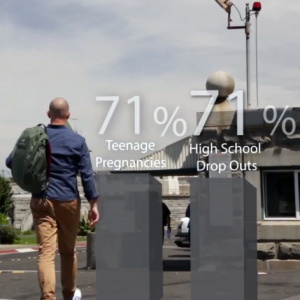The Extent of Fatherlessness

More than 20 million children live in a home without the physical presence of a father. Millions more have dads who are physically present, but emotionally absent. If it were classified as a disease, fatherlessness would be an epidemic worthy of attention as a national emergency.
The impact of fatherlessness can be seen in our homes, schools, hospitals and prisons, as reflected in the above clip from the documentary film, Irreplaceable . In short, fatherlessness is associated with almost every societal ill facing our country’s children.
How can you address the fatherlessness epidemic? Start in your own home with one or more of the following resources from NCF.
- Our Resource Center – with articles and videos on a wide variety of topics related to fatherhood.
- The CFP: Championship Fathering Profile – get feedback on 13 specific areas of your fathering—and action plans for the ones you may need to address.
- NCF’s weekly email – arrives each Friday to give you insights, encouragement, and some practical action points to help you engage your children.
- Radio Clips – hear Carey Casey with a 3-minute message that will inspire and equip you to “keep up the good work” with your kids.
- Fatherless Epidemic Infographic – Infographic full of statistics about the problems facing fatherless children today.
More Data on the Extent of Fatherlessness
-
An estimated 24.7 million children (33%) live absent their biological father.
Source: U.S. Census Bureau, Current Population Survey, “Living Arrangements of Children under 18 Years/1 and Marital Status of Parents by Age, Sex, Race, and Hispanic Origin/2 and Selected Characteristics of the Child for all Children 2010.” Table C3. Internet Release Date November, 2010.
-
Of students in grades 1 through 12, 39 percent (17.7 million) live in homes absent their biological fathers.
Source: Nord, Christine Winquist, and Jerry West. Fathers’ and Mothers’ Involvement in their Children’s Schools by Family Type and Resident Status . Table 1. (NCES 2001-032). Washington, DC: U.S. Dept of Education, National Center of Education Statistics, 2001.
-
57.6% of black children, 31.2% of Hispanic children, and 20.7% of white children are living absent their biological fathers.
Source: Family Structure and Children’s Living Arrangements 2012 . Current Population Report. U.S. Census Bureau July 1, 2012.
-
According to 72.2 % of the U.S. population, fatherlessness is the most significant family or social problem facing America.
Source: National Center for Fathering, Fathering in America Poll, January, 1999.

Trended Data
-
Among children who were part of the “post-war generation,” 87.7% grew up with two biological parents who were married to each other. Today only 68.1% will spend their entire childhood in an intact family.
Source: U.S. Census Bureau. “Living Arrangements of Children Under 18 Years Old: 1960 to Present”. U.S. Census Bureau July 1, 2012. http://www.census.gov/population/socdemo/hh-fam/ch5.xls
-
With the increasing number of premarital births and a continuing high divorce rate, the proportion of children living with just one parent rose from 9.1% in 1960 to 20.7% in 2012. Currently, 55.1% of all black children, 31.1% of all Hispanic children, and 20.7% of all white children are living in single-parent homes.
Source: U.S. Census Bureau. “Living Arrangements of Children Under 18 Years Old: 1960 to Present”. U.S. Census Bureau July 1, 2012. http://www.census.gov/population/socdemo/hh-fam/ch5.xls

- Source: Census Bureau. “Living Arrangements of Children Under 18 Years Old: 1960 to Present.” U.S. Census Bureau, July 1, 2012. http://www.census.gov/population/socdemo/hh-fam/ch5.xls
-
White children born in the 1950-1954 period spent only 8% of their childhood with just one parent; black children spent 22%. Of those born in 1980, by one estimate, white children can be expected to spend 31% of their childhood years with one parent, and black children 59%.
Source: Popenoe, David. Life Without Father (New York: Simon and Schuster, 1996), 23.

- Source: US Census Bureau, “Living Arrangements of Children Under 18”: Tables –CH-2, CH-3, CH-4. 1960 – Present. U.S. Census Bureau July 1, 2012.
Join Us

You’ve heard about the crisis of fatherlessness and the negative consequences for children and for our society. Even if you are an involved dad, until we are successful, your children and grandchildren will be growing up in a culture of absent fathers and unfathered children. They will be affected!
You can be a part of the solution!
Learn how to Get Involved , and if you’d like to support us financially, please donate today.



Where is Dr. Phil when we need him !
Fatherless Stats
Statistics of a Fatherless America
I agree completely.
There are "healthy" societies that spread parental roles among several adults, but none that simply drop the father role. All children need a father figure, and little boys in particular need an example of what they should become.
This subject is all the sadder because, statistically, fatherless boys are very likely to become absent fathers, perpetuating the problem.
Yes Bob, can you imagine a young child in the park with his or her mother and seeing a family nearby, complete with father, mother and children?
It has to make them feel something is missing, like why do they have a father and I don't? Maybe a feeling of inferiority sets up house in their thoughts of who they are.
I think the psychological damage will last a lifetime as we all look back on our childhood and our childhood shapes us to be the people we become as adults.
I don't know if the child would notice. Kids have an incredible capacity to function in anormal conditions. But whether the child is aware or not, their development is probably skewed.
I remember staying out a few hours past my curfew one night and when I arrived home my mother said your Daddy is out looking for you. Well, it wasn't my mother who I was afraid of, it was the ole man and I had been kind of partying with a few friends and we'd scored a few beers. I wasn't in any shape to get too close to him for several reasons.
I was scared to death when he came in and looked at me from across the bar. I was expecting him to come after me, but to my surprise all he did was tell me to get in bed. I guess the ride did him good. It certainly did me good.
I think he figured he had two choices and thank goodness he chose the one he did!!!
He wasn't known for putting up with any sh*t!!!
I think that the problem is worse in the black communities, but I also see it as a society problem. I know a lot of white kids in band, whose fathers are absent and don't care. My husband takes them under his wing and helps when he can...
I don't know why or when divorce became about relieving people of their personal responsibilities to their kids. My husband's first wife, just left one day-- without her child, and, eventually, he and I reared her. The mother was there, 3 nights a week- no weekends, and basically, all she did was stir up trouble. We were VERY worried when my step-daughter went to her mother's house, because she had a history of dating very shady people, and if there was a party going on, she dumped the child on her mother and went out to party. The effects of this have been long-lasting for my step-daughter. Fortunately, she seems to be a responsible adult-- (she's now pregnant)-- and I have a feeling that once the baby comes, she will have to think-- how could my mother leave me? I could never leave my child.
I don't know that you can teach personal responsibility, except at home. If a kid grows up in a household of one parent, then they likely see that as 'normal', which, with the divorce rate as it is, having a one parent household IS normal. I know many mothers that do they very best they can on their own, and are responsible, loving adults, who would not dream of leaving their kids. (Although all of us, at one time or another, feel this way--especially when one of the kids throw up in the upper bunk, and messes up both bunks, and you have to get up and go to work the next day... Those are the Calgon, Take me Away moments...)
We have a local TV program called "Deadbeat Dads", a court-room thing, where the fathers are made to pay child support, etc. I think part of its purpose is to shame the fathers into doing the right thing. But then, my husband's ex-wife never paid one dime in child support. $10 a week wouldn't gone far, but it would have made sure that she had a responsibility to her daughter.
Even a token payment of child support, is better than nothing.
She didn't contest it, either. And always told her daughter that she wished the daughter lived with her, but her father wouldn't let her. Then take him to court and ask for custody! Or shared custody! No way that was going to happen, she didn't want her daughter, she just wanted someone to blame, so she was off the hook.
It has been a nightmare dealing with her all these years... I met my step-daughter when she was 8 years old and she is now 25... UGH.
I see it a lot at preschool. It is sad that by age one, so many fathers,are out of their childrens lives, if they were even in them to begin with. This is where societys problems begin.
It seems to be, more usually, the father that leaves, but sometimes, it's the mother. Either one is horrible for the kids!
Sometimes it's the mother who is the piece of shit. When my wife left me and our two kids, she took the dog and packed her car with all the stuff she wanted, then picked up her hippy boyfriend and left to follow the Greatful Dead. Didn't hear from her for months and had no idea where to send the papers to serve her with divorce. By the time I did hear from her, she had sold everything, including her car, ditched her boyfriend, and was squatting somewhere in Colorado. Eventually she hitched a ride back to her mom's with the smelliest hippy I've ever witnessed, and the kids didn't even know who she was anymore. She got back into their lives, but she has been a nonstop disappointment to everyone ever since she left.
Didn't you know what you were getting when you bought the cow?
Some people do not think of their spouses in those terms, but coming from you... no surprise...
Not really. She wasn't always the most faithful person, but what she did was unthinkable. After the second child, she wanted a job really bad to get out of the house, because being stuck at home all day with a newborn and a toddler is hard. Our friends offered her a bartending job - worst decision ever. She reinvented herself into a bar whore.
That sucks and I'm sure it was very hard on both you and your kids. I can't relate to her views on marriage and parental responsibility but she does have good taste in music.
The experience pretty much poisoned me to the Dead, but I am a Phish fan. I respect the culture, even though it bit me pretty hard. That was so long ago that I barely remember the details anymore.
Hal,
It sounds like to me that your ex had a postpartum psychosis. My aunt had that after her second child, and it is common among young moms. With my aunt it started off mild, but by he end, she was totally schizophrenic. The family was told, that most don't go as south as my aunt did. In any case, your kids were lucky that they had you.
Maybe, but she hasn't changed all that much since then. Every relationship she gets into fails, usually because she cheats on them. She literally flipped her wig when she got that job, and never went back to being her former self. A gay neighbor from those days put it best - "it's like one day she threw her muffin pan in the air and said I'm done."
So sorry to hear this, Hal. We've been through something similar, as you can read above. I'm so glad that your kids had YOU! My husband was rearing his daughter on his own, when I met him. I felt that he was a very good person to do so and to be responsible and a loving, caring father. He is!
Now... Imagine that the kids had no father...
Inspiration and content
The song is inspired by the fact that Clapton never met his father, who died in 1985. Describing how Clapton wishes he knew his father, "My Father's Eyes" also refers to the brief life of Clapton's son Conor, who died at age four after falling from an apartment window. "In it I tried to describe the parallel between looking in the eyes of my son, and the eyes of the father that I never met, through the chain of our blood", said Clapton in his autobiography.
Growing up without a father, mother or both, maybe growing up in his or her grandparent's home which may only be a single person produces a battle within the child that can be a lifelong handicap or the one thing that motivates him or her to be more than he or she would ever have been if he or she grew up in a normal family.
The environment the child finds himself or herself in is the most important thing to help determine which direction he or she takes in life. No matter what, nothing is as easy for a child who is missing love and the love and stability of a family is the most important thing a child can have in his or her life.
Today in this "Me" society I think the proprieties are misplaced.
Probably the worst thing, worst than missing one or more of his or her parents, is living in an unstable violent environment within or without the family.
We need, as a society, to encourage the lifestyles which promote the mental health of those who will be here when we're gone. We need to start thinking more of them than us.
Love alone doesn't produce the adult we want out of the child. Discipline and empathy have to be part of the equation to allow the child to be himself or herself as well as see the world and himself or herself as an important part of society.
I think if we followed this strategy it would make a bigger difference in our society than anything else we could do.
We are seeing more and more adults that don't act like adults, Parents that don't parent, and men that don't act like men. We have run out of room under the carpet to sweep our societal ills, yet still keep doing so any way; it's past time to tackle this issue head-on.
The absolute worst thing that can happen to immature mammals is to lose their parents, to be alone, to be unprotected and cared for. Most mammal parents work feverishly to be all things for their offspring; yet humans, the top of the food chain, virtually sacrifice their children to their own greed, selfishness, avarice and depravity. It may very well be the downfall of our species. Maybe that's alright as canines are better parents to their young than many human parents I see every single day; perhaps wolves would make better shepherds for this beauteous garden we live in.
I don't believe in judgment day, but if it does come about, it will be of our own making.
We have a lot of problems in this country as many countries have and quite often we are distracted so much with our lives and the bombardment of one crisis after another, we just want to solve the problems we're having right now. We end up trying to solve these problems head-on rather than stepping back and becoming aware the problems original source needs to be the place we can make the biggest difference.
OK, this is a funny story...
As you know, my Daddy was an alcoholic. I loved him, but he was. He wasn't around all that much when I was little, and he drank-- a lot! But, of my two parents, my mother was narcissistic, so he was the saner of the two.
Anyway, about a month ago, I went for a weekend retreat with some of my high school friends... All of us grew up together, but none of them were aware of the ins and outs of my situation, because no one talked about it-- typical of families of alcoholics. I sure didn't tell anyone about it... It was "shameful". One of them was talking about how her Daddy is suffering from dementia and sees nothing wrong with going outside and urinating on the shrubs out front. She was horrified! I almost, but caught myself in time, said, "That's not normal? Gee, Daddy did that at least 3 times a week."
Just as a note, it was OK by us. It was a lot better than hosing down his underwear drawer... All you had to do was rinse the shrubs off with the hose-- a lot better than fumigating a drawer!
I guess my point is that for those of us who grew up in dysfunctional households, we may learn what is functional, but we never experience it, until we create it for ourselves... So, it's probably the same thing for kids that grew up without a father or a mother... They can be the best Dad or Mom in the world, but they can never go back and change how their own father/mother behaved.
At the risk of sounding nuts, I didn't want to be like either of my parents. My mother neglected me when my father was gone, to the point that I became very seriously ill, and she tried to give me away to my cardiologist. The only reason she kept me was because my Grandma threw such a fit, a statement that I heard repeatedly, growing up. My father just wasn't around all that much. So, I"m doing my best, with the example that my grandparents showed me. Thank God for them! They were "normal"... Of course, I've likely made some horrible mistakes, that will haunt me the rest of my days-- but at least I don't go outside and hose down the shrubs, or drink, or neglect my boy. He is fed, watered, tended to, and loved. I think we all make mistakes, and we have to do the best we can to make it better for our children.